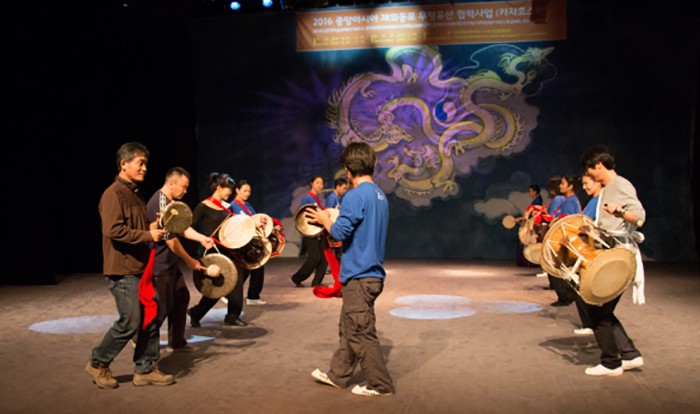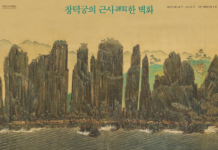
People practice traditional nongak Korean farmers’ music, including dancing and drumming, in Kazakhstan on Nov. 10. It’s part of a series of classes run by the National Intangible Heritage Center that allows people in Kazakhstan to learn Korea’s intangible cultural heritage items.
The National Intangible Heritage Center, part of the Cultural Heritage Administration (CHA), recently hosted a series of classes in major cities across Kazakhstan about traditional Korean nongak farmers’ music (농악, 農樂), one of the most memorable intangible cultural heritage items of the nation. The classes started on Oct. 29 and ran until Nov. 19, targeting all people in Kazakhstan, but especially ethnic Korean Kazakhstanis, or Goryeoin (고려인).
The program is part of a cooperation agreement between the National Intangible Heritage Center and the Korea Theater in Kazakhstan that was completed in 2013. It is now in its third year.
The traditional nongak music classes were held at the Korea Theater in Kazakhstan, the one and only theater and performing company that specifically targets ethnic Korean Kazakhstanis, at the Goryeoin Cultural Center in Almaty, and, lastly, at the Al-Farabi Kazakh National University.
Ethnic Korean Kazakhstanis and other participants at those locations learned how to play traditional Korean musical instruments and how to perform one of the most famous traditional farmers’ songs which originated in Pilbong-ri in Gangjin-myeon, Imsil-gun County, Jeollabuk-do Province. It’s called “Imsil Pilbong Nongak” (임실 필봉 농악, 任實 筆峰 農樂).
Similar classes took place in Kostanay, a smaller city located in northern Kazakhstan, from Nov. 11 to 18, as well.
“The number of ethnic Korean Kazakhstanis across Kazakhstan has currently reached about 100,000, 45 percent of who are living in Almaty. This program has undoubtedly given them a good opportunity to get a deeper understanding of what Korea is like and what its traditional sounds are like, as well as to realize that they will have to continue to maintain their ethnic identity,” said a representative from the National Intangible Heritage Center.
By Sohn JiAe
Korea.net Staff Writer
Photo: National Intangible Heritage Center
jiae5853@korea.kr























